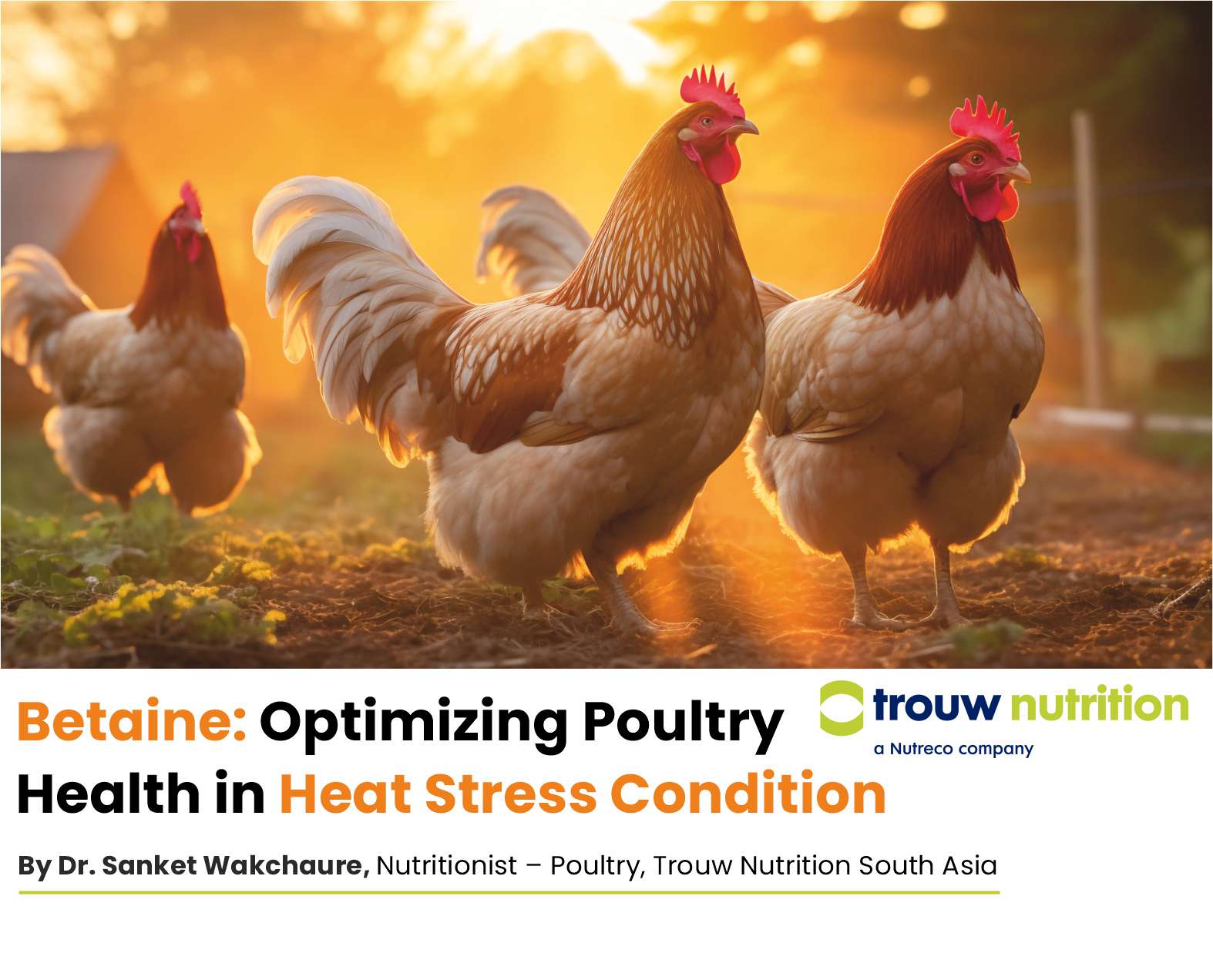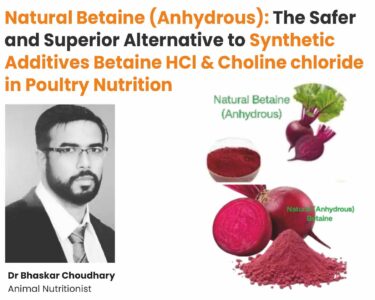Betaine: Optimizing Poultry Health in Heat Stress Condition
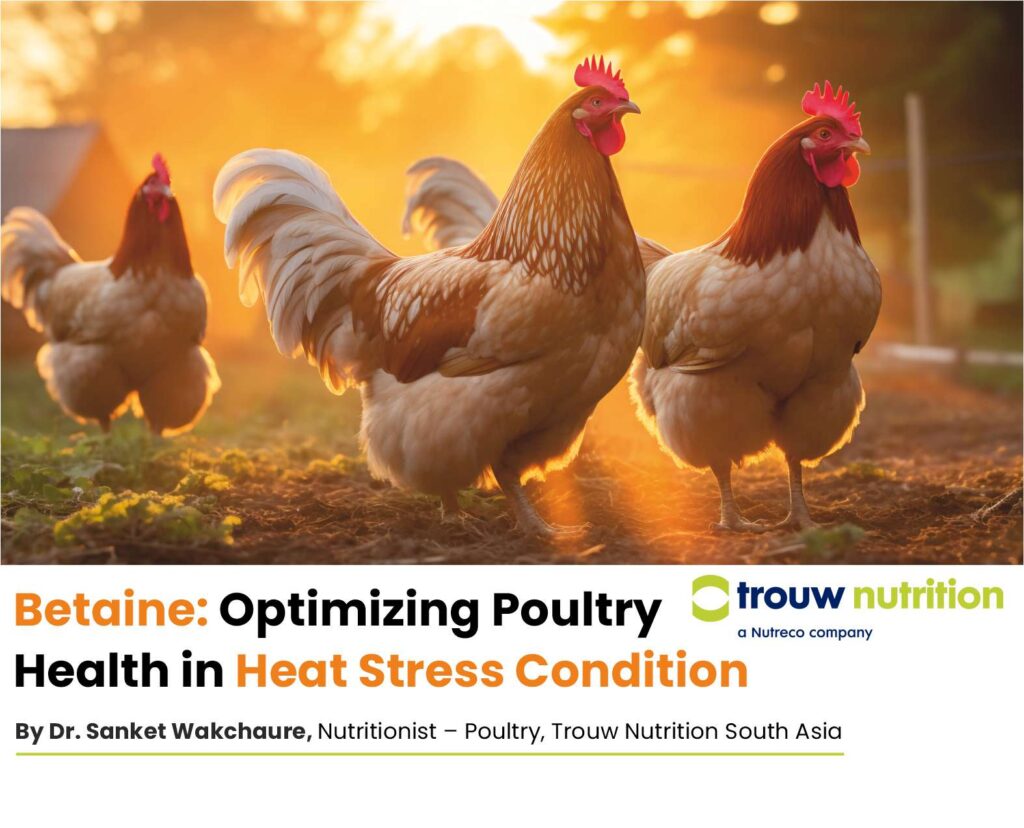
1. What is betaine?
It was first discovered in the juice of sugar beets. Naturally accumulated in plants as osmolyte to protect against salt and temperature stress. Derivative of glycine (amino acid). Neutral molecule with bipolar structure (zwitterion) as shown in Fig. 1 contains three methyl groups.
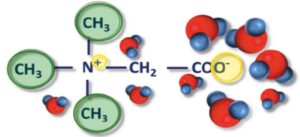
Fig.1: Chemical Structure of Betaine
2. Betaine functions as (mode of action):
A. Methyl donor – methyl groups used for protein synthesis and other metabolic processes. Methyl groups play a pivotal role in several cellular processes, including DNA methylation, synthesis of phosphatidylcholine, and protein synthesis. Choline and betaine are both capable of donating methyl groups. However, for choline to do so, it must first be converted into betaine as shown in Fig. 2. In poultry, the capacity to synthesize betaine from choline is limited, thus making dietary supplementation the primary source.
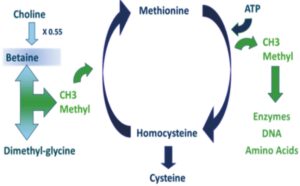
Fig. 2: Role of betaine in the methionine cycle in liver
Betaine can substitute for choline in performing the following functions:
1) Regulating fat metabolism in the liver to prevent abnormal fat accumulation in hepatocytes.
2) Serving as a methyl donor for the formation of methionine and creatine, through its involvement in the transmethylation pathway.
Betaine cannot replace choline in the function of maintaining cell membrane and structure as an emulsifier to transport lipids, since choline is a constituent of phospholipids. Similarly, betaine cannot replace choline as a precursor of acetylcholine in the transmission of nerve impulses.
B. Osmo-regulator: – ability to bind and retain water in a reversible manner.
Osmolytes are compounds that aid in the regulation of osmotic pressure within cells and tissues, playing a crucial role in preserving cellular integrity.
Dehydration, disease, heat stress, and other factors can cause alterations in the water content of cells. Osmolytes can be either inorganic ions such as Na+, K+, Cl-, or organic compounds such as amino acids, certain sugars, and betaine. Betaine plays a crucial role in stabilizing cellular metabolic function during periods of stress, preserving the cell’s capacity to uptake nutrients, unlike osmolytes such as Na+, K+, and Cl-. Moreover, it offers protection to intracellular enzymes against osmotic inactivation.
3. Heat stress
Heat stress is a major challenge in poultry production, especially during the hot summer months. It occurs when birds face difficulty in achieving a balance between body heat produced and heat loss. This imbalance can lead to several health issues and production losses.
4. The Role of Betaine in Enhancing Poultry Health During Heat Stress.
a) Betaine aids in preserving intestinal integrity by facilitating water retention, increasing cell volume, promoting anabolic activity, and maintaining cellular integrity as shown in fig. 4. which are Representative photomicrographs of the ileum after 10 days of the experiment from broilers fed a control diet (CON, A and C) and betaine (BET, B and D) on villous height under thermoneutral (TN, A and B) or after 10 days being exposed to heat stress (HS, C and D).
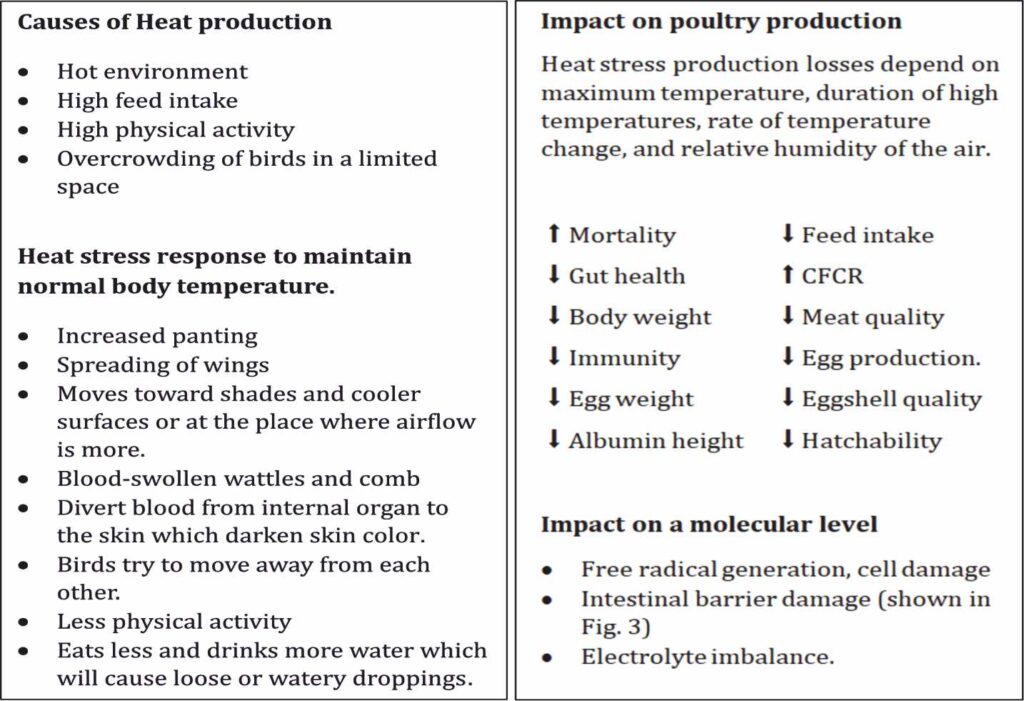
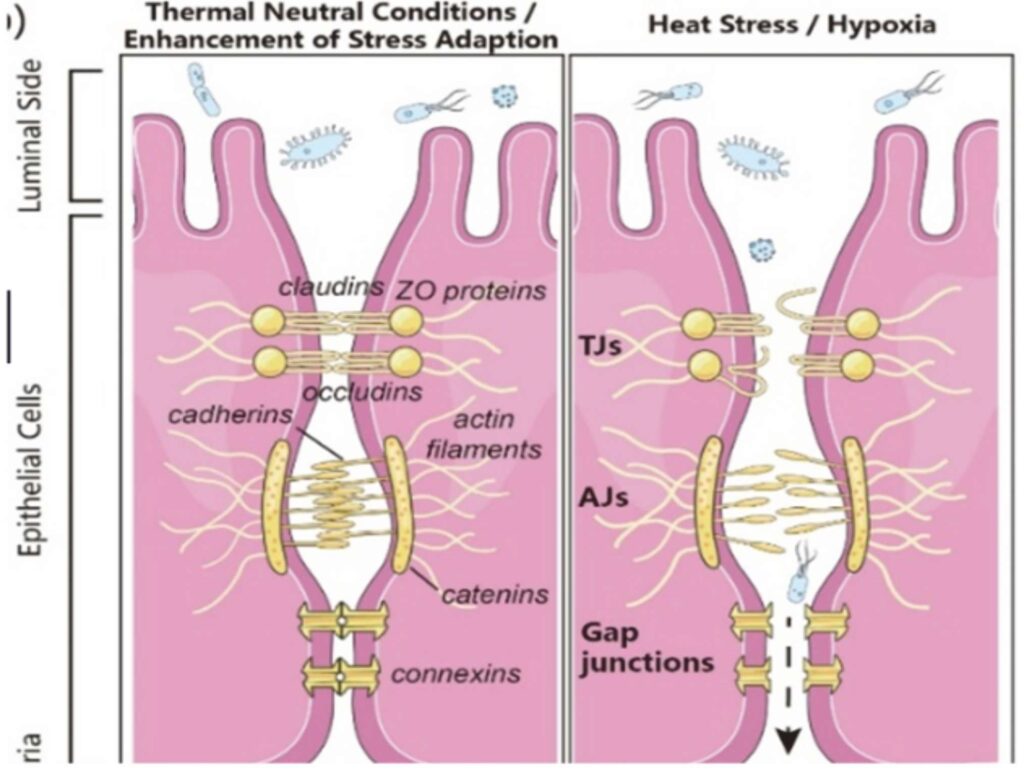
Fig. 3 – Intestinal barrier damage in HS (Soheil Varasteh, et al. Nutrients, 2020)
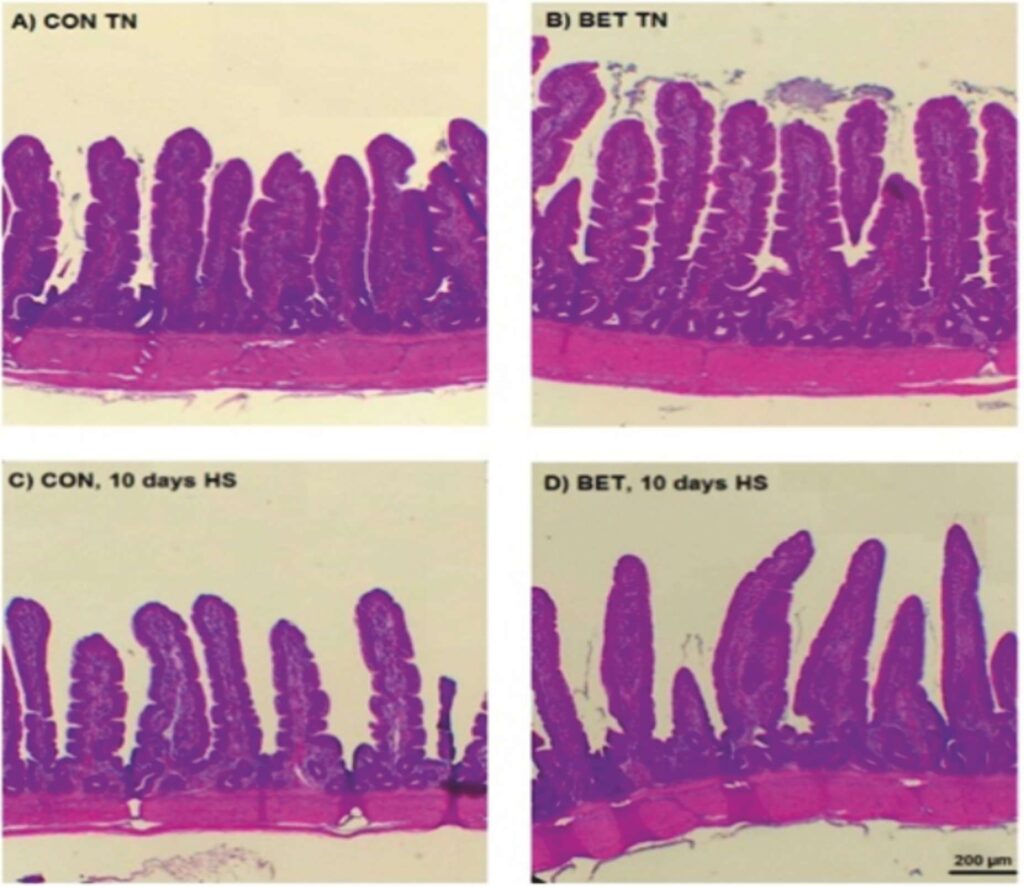
Fig. 4 – Impact of betaine on intestinal integrity of broiler birds in Heat stress conditions (Shakeri et al, Animals 2020)
b) Betaine has three methyl groups in its structure and donates them in various metabolic reactions, which can spare compounds like methionine, choline, and folic acid. Therefore, supplementing with betaine may reduce the need for these nutrients.
c) The growth rate of poultry birds is enhanced by betaine, which conserves energy that would otherwise be expended on the Na+/K+ pump and Calcium pump in high temperatures. This conserved energy can then be directed towards growth.
d) Betaine enhances the concentration of beneficial short-chain fatty acids, such as acetic and propionic acid, which are vital to host bacteria like Lactobacillus and Bifidobacterium in poultry. This improvement enables these bacteria to effectively inhabit the caecum and inhibit the colonization of harmful bacteria in the intestinal tract.
e) Betaine supplementation in laying hens leads to an increase in daily egg mass production, reduces thin eggshell issues which are related to heat stress, and helps to enhance serum concentrations of estradiol and melatonin.
f) Trouw Nutrition’s Betaine is proven to elevate production performance even under heat stress conditions, notably increasing breast meat percentage through the provision of essential methyl groups, as depicted in Fig. 5. Recognizing that high-performing animals demand superior nutrition for sustained health and optimal growth, Selko Feed Additives introduces TNIbetain. This meticulously tested supplement supports animal performance across multiple metabolic pathways. TNIbetain adheres strictly to the stringent quality standards upheld by Trouw Nutrition Feed Additives.
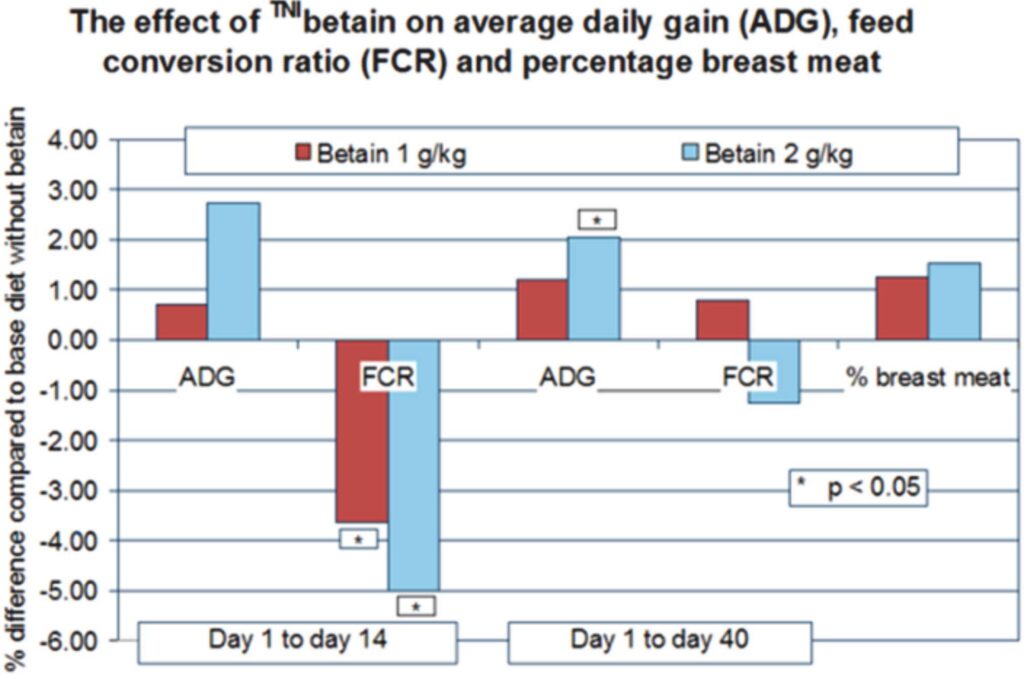
Fig. 5: Effect of Trouw Nutrition betaine on broiler performance
Contrasting the Attributes of Trouw Nutrition’s Natural Betaine with Synthetic Betaine
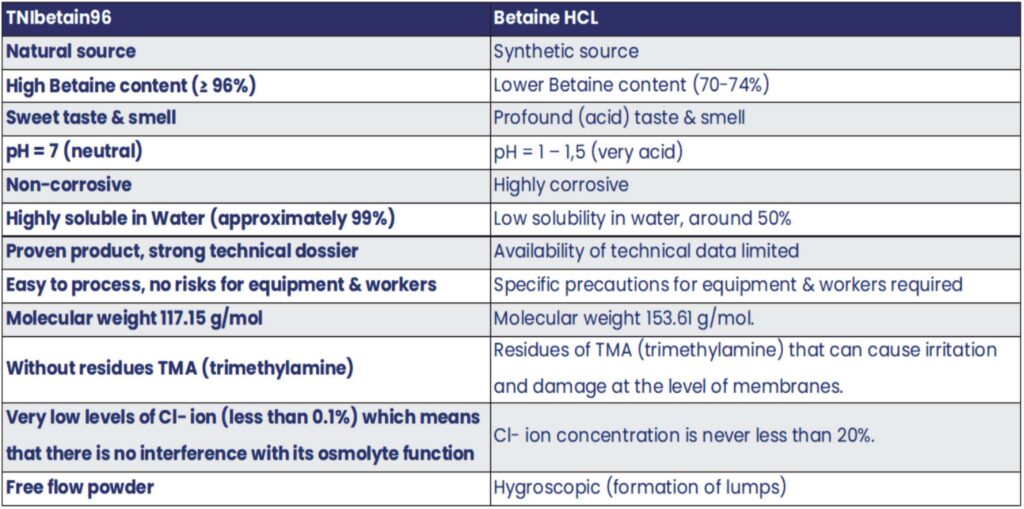
Recommended Dosage:
For broiler, layer, and breeder birds: 0.5 to 1 kg per ton of feed. However, in challenging conditions such as heat stress, the Betaine dosage can be increased to up to 2 kg per ton of feed.
g) Betaine has been found to significantly enhance hematological parameters, including RBC and platelet count, while reducing the number of heterophils and increasing the number of lymphocytes. The reduction in lymphocyte count during heat stress is attributed to the rise in inflammatory cytokines, which stimulate hypothalamic production of corticotrophin releasing hormones.
h) Betaine aids in the expansion of intestinal mucosa, thereby enhancing the absorption and utilization of nutrients, which results in improved digestibility of crude protein, crude fiber, ether extract.
i) Studies have demonstrated that betaine interacts with lipid metabolism by promoting the oxidative catabolism of fatty acids through its involvement in carnitine synthesis. Therefore, betaine can be utilized to increase the proportion of lean meat and reduce fat in poultry carcasses.
j) Betaine acts as an osmoregulatory in the intestine, optimizing water and salt balance within cells for efficient nutrient absorption and reducing litter moisture. It increases villus height, protecting enterocytes during challenges like coccidiosis, and strengthens the gut, reducing damage during infections as shown in Fig. A, B and C.
The various effects described above are either directly or indirectly linked to betaine’s osmoregulatory function and its role in methionine biosynthesis.
Betaine emerges as a pivotal component in poultry health management, particularly in the face of heat stress challenges. Originating from sugar beets, its molecular structure rich in methyl groups facilitates its dual function as a methyl donor and osmoregulator, essential for maintaining cellular integrity and supporting metabolic processes. Amidst heat stress conditions, Betaine supplementation showcases remarkable efficacy, preserving intestinal integrity, conserving energy expenditure, and enhancing production performance. Its multifaceted benefits extend to improvements in hematological parameters, nutrient absorption, and lipid metabolism. With its proven effectiveness and adherence to stringent quality standards, Betaine stands as a crucial asset in optimizing poultry health and performance under challenging environmental conditions, exemplifying the potential of innovative nutritional strategies in safeguarding livestock welfare and productivity.

For further information, kindly write to us at customercareindia@trouwnutrition.com or visit our website: www.trouwnutrition.in


